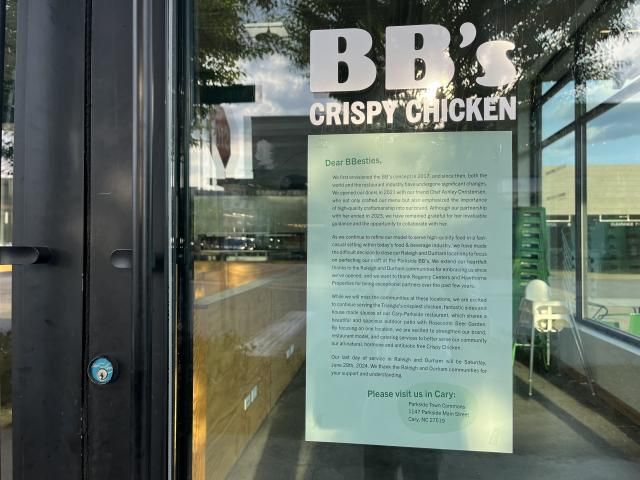Bussiness
Changing dining habits contributing to Raleigh restaurant closings, economist and business owners say

Shawn Benjamin lives in Raleigh and describes himself as a “foodie,” eating out an average of three times per week.
“There’s a lot of nice places in Raleigh,” he said. “I’m always hungry … always trying to get something to eat.”
However, many Raleigh residents are seeing their options drop as several restaurants in Raleigh have closed their doors in 2024. Since the start of the year, at least seven restaurants have closed, with some continuing operations elsewhere.
The restaurants that either closed, plan to close or shift operating locations in and around downtown Raleigh since the start of the year are as follows:
Restaurant owners are pointing to changes in consumer habits.
“I’ve spoken with several other restaurant owners in Raleigh, and it’s not bad management, but rather a huge swing in how consumers are spending these days,” Clouds Brewing Owner Matt MacNeil said.
Steve Allen, an economics professor at North Carolina State University, said several businesses in the hospitality industry were hit hard by the Covid-19 pandemic.
“The pandemic was a terrible blow to the entire industry, hotels and restaurants,” he said.
According to a study from Andrew Berger-Gross from the North Carolina Department of Commerce, North Carolina had 39,000 fewer restaurant workers in 2021 than expected. In December 2021, the Census Bureau reported 133,000 North Carolinians were out of work because they contracted COVID-19, were caring for someone with coronavirus symptoms or concerned about contracting and spreading it.
While the study showed hiring conditions have improved by August 2022, and a Nationwide Insurance study said restaurants have bounced back in 2023 since the pandemic, MacNeil said several places seen as ideal are also changing.
“Look at Plates, an amazing location with great food. They are closing as that section of Glenwood has turned into dance club alley,” he said. “High-end customers now avoid that area.”
Plates Neighborhood Kitchen announced it will close its doors at the end of July.
“When we opened in 2013, we did so with the belief that everyone deserves a relaxed, neighborhood restaurant where they can enjoy a delicious meal and warm hospitality,” the restaurant wrote in an Instagram post. “Over the past decade, we have grown alongside our neighborhood, but we never compromised on this principle.”
Allen also added food price inflation in 2023 is a contributing factor, and a report from the Bureau of Labor Statistics says there was more than 5% jump in restaurant prices last year, but Allen said inflation has slowed in recent months.
“A lot of things [were] pushing up costs a couple of years ago [but] those aren’t drivers in the restaurant industry today,” Allen said.
As for why some restaurants have continued operations in other cities and elsewhere in Wake County, Allen said workers getting to the restaurant or working a hybrid schedule could be a contributing factor.
“If workers are only coming in two to three days a week, that’s a big problem for restaurants,” Allen explained. “Location can be a critical factor whether a restaurant is going to have a healthy future or a more challenging one.”
“I love downtown Raleigh, but I won’t reopen anything there for several years until things change again,” MacNeill said.
Allen also said while several restaurants have closed this year, the industry is constantly changing, and more restaurants are opening.
“This is an industry subject to constant change, so you’re always going to see new restaurants opening, and we’ve got a bunch opening,” he said,
Allen mentioned restaurants opening in Glenwood South’s Smokey Hollow, North Hills and downtown Raleigh, including Lobera, which will occupy Gonza’s former location.
Benjamin said he will continue supporting the local restaurants in and around Raleigh because the food brings people together.
“Support local businesses because it’s delicious, and this is where we live, so this is where we should eat and hang out,” he said. “It’s a better community when there’s better food.”













